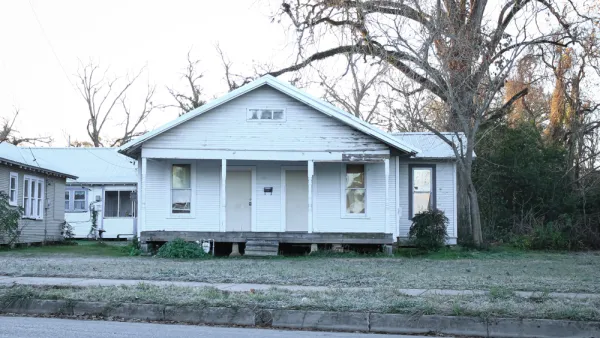A new White House policy to reduce homelessness seeks to address the root issues that cause people to lose housing and stimulate housing production.

Writing for NPR, Jennifer Ludden reports on the Biden administration’s new plan to address the nation’s homelessness crisis. As Ludden explains, while hundreds of thousands of unhoused Americans have moved into housing in the last five years, roughly the same number have become homeless in the same period, canceling out any progress. “Over the course of this year, more than a million individuals and families were without housing at some point, and they were disproportionately people of color, a disparity the plan aims to address.”
The White House plan calls for a 25 percent reduction in the number of unsheltered people in the next three years. “The new plan includes a range of ways to boost the supply of affordable housing, as well as increase the number of emergency shelters and support programs. But its biggest change is a call for the ‘systematic prevention of homelessness,’ focusing on those who are struggling to keep them from losing their housing.”
The policy signals a shift toward addressing the root causes of homelessness and developing interventions that help people stay in their homes. In San Diego, a pilot program subsidizes rent for low—income seniors and others, distributing relatively small amounts of money—up to $500—that can make a crucial difference for households struggling to keep up with rent.
The article describes other programs designed to identify people at risk for losing their housing and providing assistance early on. Advocates say this not only helps keep people housed, but reduces the cost of interventions.
Meanwhile, the policy acknowledges the impact of the country’s housing shortage. “Among many other things, the Biden administration's plan on homelessness includes ongoing efforts to make it easier to use federal tax credits to build low income housing, and encourages communities to rezone for denser development.”
FULL STORY: It is the obvious thing.' The White House tries a new tack to combat homelessness

Analysis: Cybertruck Fatality Rate Far Exceeds That of Ford Pinto
The Tesla Cybertruck was recalled seven times last year.

National Parks Layoffs Will Cause Communities to Lose Billions
Thousands of essential park workers were laid off this week, just before the busy spring break season.

Retro-silient?: America’s First “Eco-burb,” The Woodlands Turns 50
A master-planned community north of Houston offers lessons on green infrastructure and resilient design, but falls short of its founder’s lofty affordability and walkability goals.

Test News Post 1
This is a summary

Analysis: Cybertruck Fatality Rate Far Exceeds That of Ford Pinto
The Tesla Cybertruck was recalled seven times last year.

Test News Headline 46
Test for the image on the front page.
Urban Design for Planners 1: Software Tools
This six-course series explores essential urban design concepts using open source software and equips planners with the tools they need to participate fully in the urban design process.
Planning for Universal Design
Learn the tools for implementing Universal Design in planning regulations.
EMC Planning Group, Inc.
Planetizen
Planetizen
Mpact (formerly Rail~Volution)
Great Falls Development Authority, Inc.
HUDs Office of Policy Development and Research
NYU Wagner Graduate School of Public Service




























